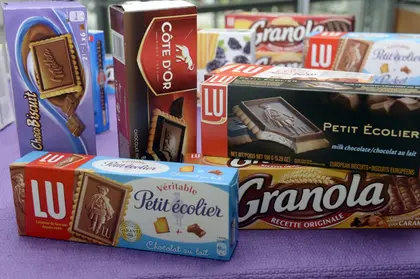Mondelez International, an American snacking giant and the maker of Milka, Cadbury and Toblerone chocolates, has been featured prominently in the news in the last few weeks. The company’s continued operations in Russia came to the forefront of the news coverage and rightly so. Despite a promise to scale back its business in the aggressor state by the end of 2023, there are no visible signs of the company actually doing so as it continues to run three factories in Russia, employing 3,000 people and “supporting 10,000 farmers.”
Instead, Mondelez, which justifies its presence in Russia under the pretext of providing “essential goods,” has simply reshuffled its European leadership team to create an impression of independence of its Russia unit. According to a corporate governance expert quoted by Reuters, "This is an attempted workaround that is not very meaningful. There are certain kinds of business connections where you see a justification, if it has to do with health, urgently needed supplies. These are cookies and there really is no excuse."
JOIN US ON TELEGRAM
Follow our coverage of the war on the @Kyivpost_official.
The most unexpected revelation came from Mondelez CEO Dirk Van de Put, who in conversation with the Financial Times said that the company’s investors do not “morally care” about its continued business in Russia. The reaction was fast and furious. The CEO of another Mondelez investor Wespath Benefits and Investors, Andrew Hendren, labeled van de Put’s comments “tin-eared and false.” In November 2023, Wespath filed a shareholder resolution asking the board to commission a report assessing the company’s implementation of its human rights policy, with a focus on its operations in Russia and Ukraine. “If Van de Put requires evidence that investors care about these matters, he need only look at his company’s upcoming proxy statement,” said Hendren.

1,100 North Korean Casualties in Russia-Ukraine War: Seoul
Bennett Freeman, one of the B4Ukraine co-founders and a former Senior Vice President of Calvert Investors, responded by calling the views of Van de Put “myopic” as it overlooks “the galaxy of risks” for companies that chose to stay. Freeman called “this cold amorality chilling in the face of multiple war crimes committed by Russia over the past two years.” The newly issued US business advisory on Russia points in the same direction, stating that “businesses and individuals operating in Russia or occupied territories are at risk of being implicated in Russia’s violations of international law and human rights abuses.” There have been over 127,000 Russian war crimes recorded since the full-scale invasion of Ukraine.
The reaction from the United Kingdom, a key European market for Mondelez, which acquired Cadbury in 2010 as a result of a hostile takeover, did not wait either. Senior member of the British Parliament called on Mondelez to withdraw from Russia and stop funding its “war machine.” A member of the conservative party Bob Seely, who also chairs the Ukraine Parliamentary Group, highlighted that “any company doing business in Russia without good reason should suffer reputational damage,” adding: “They are helping fascism, pure and simple.”
But what about Mondelez employees and customers? What do they think about the company’s presence in Russia, aiding the Kremlin to prolong its brutal war against Ukraine?
Since the start of the full-scale invasion, Mondelez employees initiated two global petitions, urging their leadership to take a clear stance against “war crimes and genocide happening in Ukraine.” They called for the complete suspension of business activities in Russia, stating that they “cannot agree with the decision to maintain supply of non-essential snacks and support farmers in Russia when the price of such support is the lives of our colleagues in Ukraine.”
In February 2024, the B4Ukraine coalition asked Mondelez consumers to share their views via an anonymous survey, and here are some of their most telling responses:
“It would be long overdue to exit, but better late than never. As a consumer, I will remember forever the ones that stayed too long, and will likely never forgive, but maybe some consumers won’t care that much.”
“Mondelez disgusts me. We would not sell our products to their organization until they address their values and leave the Russian market.”
“I think people who work at Mondelez globally should face pressure or at least be made aware of how their work contributes to Russia’s war machine. The C-level only cares about profit, but I think the normal people working at Mondelez might still have a moral compass.”
"Forgot they owned Cadburys. Stopped buying Milka chocolate a while ago, guess what has just made my own personal ‘embargo list.’ Will now check out all of the rest of their brands and make sure they are not bought by myself and promote their embargo with friends and family too. I saw the pictures of a poor Ukrainian mother probably holding her children, we don’t really know as the missile strike was so hard that even their bones were just dust. Mondelez has a choice and, as Western consumers, so do we.”
After two years since the start of the full-scale invasion and ten years since the start of Russia’s assault on Ukraine, we urge Modnelez to drop its keys and leave the Russian market, pursuing international arbitration similar to what other companies have done. The alternative is to remain, fund the Kremlin’s militarized budget, risk becoming complicit in Russia’s war crimes and be liable for future reparations to Ukraine. The choice is clear, but the key question is: will Modnelez budge?
You can also highlight the text and press Ctrl + Enter






